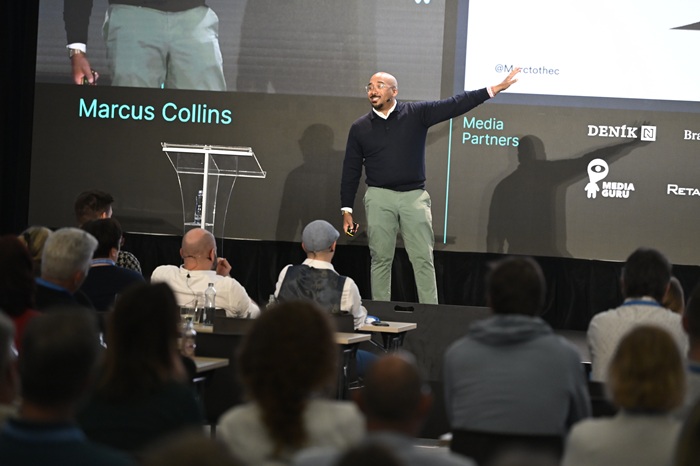Culture is the strongest external force influencing human behaviour. Brands need to understand this and work with it in their communication and campaigns. "Things are not what they are. They are what we are," demonstrated Marcus Collins at this year's Communication Summit conference organised by Blue Events. The strategist, who helped build brands such as Apple, Nike and Beyoncé, was the keynote speaker at this year's edition of one of the largest domestic conferences on communication and marketing.
Although everyone from marketers to HR professionals talk about culture, few really understand it. According to Collins, culture is an ‘operating system’ that determines what is acceptable and expected in our society. Demographic categories such as age, gender or income are too simplistic; according to Collins, we should focus on human identity. ‘Demographic categorisation is easy, but it's not accurate. People's real behaviour is shaped by their identity, who they are and who they identify with,’ he explained.
McDonald's: From the bottom to the top
Using the example of the McDonald's brand, Collins showed how ‘cultural power’ can be applied. In 2014, McDonald's was still one of the least popular companies in the United States. Nevertheless, 68 million people visited its restaurants every day. Collins worked with the brand at the time and suggested that it focus on the customers who liked it. Until then, the brand only knew ‘hard’ data about its customers, but knew nothing about their cultural identity. The team therefore set off on a journey across the United States, where they conducted ethnographic research among fans of the brand. The result was a book that connected McDonald's customers. It turned out that ‘everyone has their favourite order at McDonald's, including famous people’.
This idea gave rise to the Famous Orders campaign, which first introduced what famous people order at McDonald's in 2020. This was followed by a collaboration with rapper Travis Scott, whose favourite order (McRoyal with bacon, cheese and salad) sparked a shopping frenzy. The campaign resulted in a $50 million increase in sales in four weeks and a doubling of McRoyal sales. Subsequently, sales grew at double-digit rates without the company introducing a new product. ‘We didn't sell any new products. We just put it in a cultural context that resonated with people,’ explained Marcus Collins. The campaign, created by New York agency Wieden+Kennedy, also won awards at a number of competitions. It also contributed to McDonald's ranking among the strongest brands in 2023.
And when competitors tried to imitate the approach, they failed. ‘Because they copied all the tactics without understanding the strategy. Or to put it another way, they copied all the executions without understanding the cultural truths on which those tactics were designed,’ he summarised.
Understanding people, not just selling to them
According to Collins, McDonald's success was not based on advertising tactics, but on understanding the deeper cultural truths that shape people's everyday decisions. In other words, the brand spoke the language of its customers through their artefacts, behaviour and language. "It's not about what the brand says. It's how people use the brand to express their identity. Consumers don't follow your brand because they love it. They follow it because they love their friends and want to connect with them," he said.
According to Collins, marketers and brand managers should stop relying on stereotypes and start looking at who people are. This means looking for how they identify themselves, who they identify with and what language they use. ‘You have to be culturally relevant. And that means not just talking to your people, but talking like them,’ Marcus Collins said in his speech in Prague. At the same time, he emphasised the power of human contact and communication. ‘People trust strangers more than they trust you (as brand representatives, ed.). They rely more on Amazon reviews than on the description of a brand they could buy from. And why? Because we trust people more than we trust any brand,’ he concluded.
Source: mediaguru.cz

